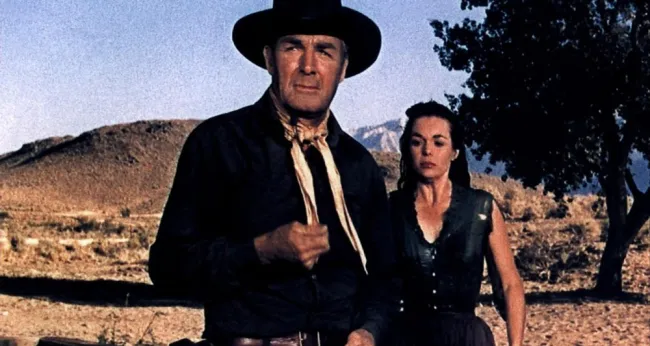Comanche Station: Randolph Scott’s Grimy Swan Song—Or the Western Genre’s Last Gasp of Toxic Nostalgia?
Let’s cut through the sepia-toned nostalgia: Comanche Station (1960), Randolph Scott’s so-called “stoic farewell” to Westerns, isn’t a masterpiece—it’s a eulogy for a genre rotting under the weight of its own myths. Directed by Budd Boetticher and dripping with the macho fatalism of the Ranown Cycle, this film isn’t just about a man rescuing a captive woman; it’s a desperate attempt to sanitize America’s bloody frontier history while fetishizing its violence. Think it’s a nuanced classic? Let’s dig into the dirt.
The Plot: Altruism or Exploitation?
Jefferson Cody (Scott) “rescues” Nancy Lowe from Comanches, but let’s not pretend this is heroism. The $5,000 reward for her return—dead or alive—exposes Cody’s mission as a transactional farce. Is he a noble loner or a mercenary clinging to the delusion of redemption? And Nancy? Reduced to a prop, her trauma sidelined to fuel Cody’s existential crisis. The film’s "restraint" isn’t artistry—it’s emotional cowardice, refusing to confront the grotesque reality of captivity narratives.
Meanwhile, the Comanches? They’re painted as “honorable negotiators,” a pat on the back for 1960s audiences craving moral absolution. But let’s be real: this isn’t progress. It’s Hollywood whitewashing, turning genocide into a backdrop for white male angst.
Production: Cheap Tricks and Aging Icons
- Scott’s Last Stand—Or Last Gasp?
At 62, Scott’s leathery face and stiff gait aren’t “authentic”—they’re a glaring reminder that Hollywood couldn’t let go of its aging cowboys. His deafness onset? A metaphor for the genre’s refusal to listen to a changing world. The man’s a relic, dragging the Western into the grave with him. - 12 Days, a Budget, and a Stunt Double
Boetticher shot this in 12 days. It shows. The Alabama Hills aren’t a majestic backdrop—they’re a cheap set for a film that couldn’t afford grandeur. Sylvia Durando, the stunt double tossed into a trough repeatedly? Her bruises are the real legacy here: Hollywood chewing up women (literally) to prop up male fantasies. - Claude Akins: The Only Man Having Fun
Ben Lane (Akins) isn’t a villain—he’s the film’s id. While Scott mumbles about honor, Akins cackles, scalps, and steals scenes. His death isn’t tragic; it’s catharsis. Finally, someone admits this whole frontier charade is about greed.
Legacy: A Fossil in Eastwood’s Shadow
Comanche Station gets praised as a “bridge” to revisionist Westerns. Bullshit. Clint Eastwood’s Unforgiven didn’t riff on this film—it buried it. Boetticher’s minimalist angst feels quaint next to Eastwood’s nihilism. And that final shot of Scott riding into the sunset? It’s not poetic. It’s the genre slinking away, ashamed of its own myths.
Conclusion
Comanche Station isn’t a classic—it’s a confession. A confession that the Western’s “golden age” was built on lies: lies about heroism, lies about justice, lies about who gets to be human. Randolph Scott’s stoicism isn’t admirable; it’s pathological. The film’s real tragedy? That we still romanticize it.
“If I loved her, it wouldn’t matter.”
Damn right, Cody. But you don’t love her. You love the lie.
Burn It Down: Watch Comanche Station for the history, then throw it on the pyre of revisionist cinema. The West wasn’t won—it was stolen. Time we stop applauding the thieves.
